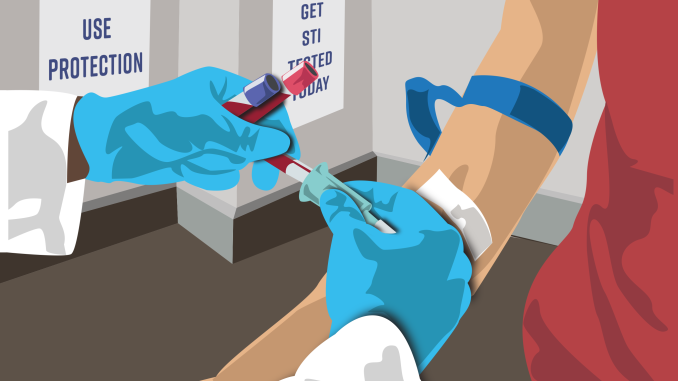
Temple University has a reputation for being the most sexually active college campus in the country, but the risk of contracting a sexually transmitted infection is becoming more likely as transmission rates increase nationally and locally.
Philadelphia has the fourth highest STI transmission rates in the United States as of the beginning of this year. STI rates are also rising nationwide, including a 26 percent increase in syphilis, a potential result of increased sexual activity after COVID-19 restrictions were lifted, CBS News reported.
One in four college students has an STI and they are particularly at risk of transmitting and receiving an STI, according to HealthNewsHub. College-age students are more sexually active and may be less experienced with using protection while having sex, said Thomas Trojian, assistant clinical director for student health operations at Student Health Services.
Chlamydia, herpes and HPV are the three most common STIs among Temple’s student body, according to Student Health Services.
As STI rates reach heights unseen in decades in the U.S. due to COVID-19 restrictions being lifted, it’s important for sexually active students to communicate with their partners about using protection and testing regularly for STIs to help prevent transmission. Normalizing these conversations can encourage safe sex practices and reduce the stigma that considers someone, with an STI or who has tested for an STI, to be “unclean” or “impure.”
Temple students can register for STI testing on the Patient Health Portal as a precautionary measure or if they know they’ve been exposed.
Students do not need health insurance to receive an STI test at Student Health Services. All testing is available on a sliding scale, meaning if a student doesn’t have insurance, Student Health will charge based on the person’s income, said Michelle Scarpulla, a social and behavioral sciences professor and former employee of Answer, a national organization that provides sexual education.
Organizations near Main Campus like the Mazzoni Center, an LGBTQ-focused health and wellness establishment, offer STI and HIV testing at 1348 Bainbridge Street. Planned Parenthood also offers STI testing at the Elizabeth Blackwell Health Center at 1144 Locust Street. The AIDS Healthcare Foundation also has an STI testing location at 1211 Chestnut Street, Suite 405.
“If you’re having multiple sexual partners, especially something on a college campus, that’s your moral responsibility to tell other kids if you have symptoms,” said Liana Hoffman, a junior health professions major.
However, many STIs appear asymptomatic. If someone rarely engages in sexual activity or has sex once or twice a year, they should test annually, while people with multiple partners should test as often as possible. New couples should get tested before having unprotected sex, according to the National Coalition for Sexual Health.
“Someone can have one of the sexually transmitted infections, and not know it,” Scarpulla said. “They can be passing it on to others, and meanwhile it can be doing harm to their own body.”
Although some Temple students may use a form of birth control to help prevent pregnancy, most contraceptives do not stop the spread of STIs. Condoms are the only contraceptive that can assist in reducing the risk of both pregnancy and infection.
Free condoms are available at Temple’s Wellness Resource Center, Student Health Services and the Philadelphia Department of Public Health wellness centers located at1930 South Broad Street and 1900 North 20th Street.
Condoms are more than 90 percent effective in preventing STIs, yet only 62 percent of college students usually or always use condoms, according to CollegeStats, a database of college-related research.
However, condoms are not 100 percent effective at preventing the spread of STIs, so every sexual experience could pose risk of transmission. To practice lower-risk safe sex, students should have open, nonjudgmental conversations about sexual health with their partner and ask when their last STI test was, according to the Centers for Disease Control and Prevention.
It’s better to discuss sexual health in a neutral location that isn’t the bedroom where both parties feel comfortable and are unable to be interrupted, Scarpulla said. Students should have these conversations before they get intimate in the bedroom.
“Honest health communication is the best that we can do,” said Anne Frankel, a social and behavioral sciences professor. “The only way we’re going to de-stigmatize this issue is by discussing it.”
Having an active sex life in college is normal, but students must have honest and open conversations with a partner prior to sex. If anyone is sexually active, it is important to utilize risk reduction strategies like frequent testing and using protection.
“If you say yes to sex, say yes to testing,” Trojian said.
Rachel Townsend contributed data visualizations.



Be the first to comment